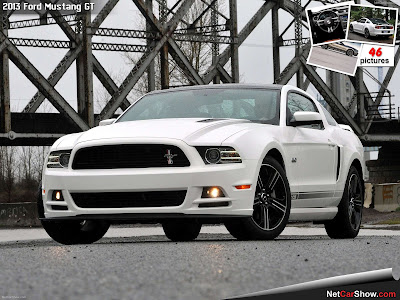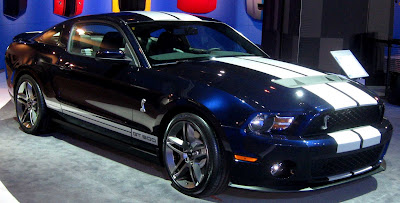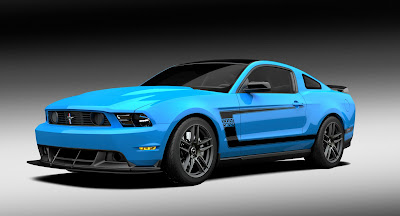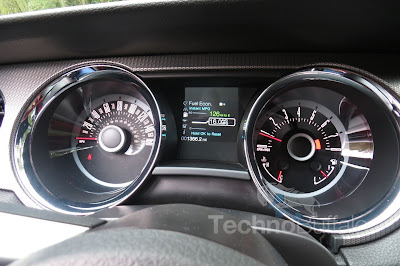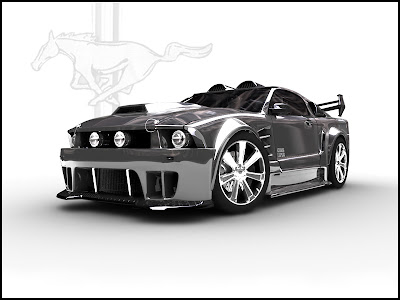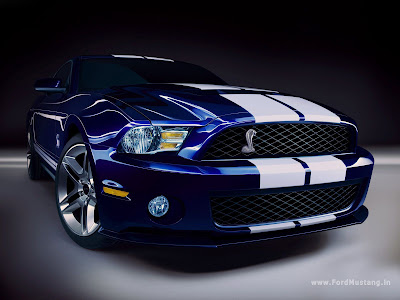What's New for 2013
The 2013 Ford Mustang receives updated exterior styling, available Recaro sport seats and a new performance-oriented display in the gauge cluster. The GT's V8 is a bit more powerful this year, and the automatic transmission now comes with manual shift control.
Introduction:
There's a distant drumbeat being heard among the Ford Mustang faithful. Its cadence grows louder and more impatient with every passing day. We expect it to reach fever pitch when the 50th-anniversary Mustang is unveiled next year. With this in mind, you would expect few changes to the 2013 Ford Mustang, understandably assuming that Ford's resources would be focused on the all-important next generation. But you'd be mistaken.The 2013 Mustang receives a fair number of upgrades and additions. On the outside, the Mustang gains standard xenon headlights with LED accents, a new Shelby-inspired grille, restyled front and rear fascias, functional hood vents, painted rocker panels and updated taillights. Inside the cabin, there's a new performance information display in the gauge cluster and available Recaro seats (previously limited to the Boss 302 and GT500).Topping the mechanical changes is an updated automatic transmission that now has manual shift control. However, while it's nice that you can now select your own gearing in the automatic-equipped Mustang, its shifter-mounted toggle button would be unintuitive in a family SUV, let alone a sport coupe. A Mustang should have paddle shifters. Luckily, this year also brings an 8-horsepower boost for the GT's V8 engine, hill-start assist for cars equipped with manual transmissions and additional performance hardware for the GT's optional Track package.These changes certainly enhance what was already a very impressive sport coupe and convertible. The entry-level Mustang's V6 engine churns out an impressive 305 hp and earns a laudable 31 mpg on the EPA highway cycle. The V8-powered GT and Boss 302 bring even more power into the mix. For just about any Mustang model, Ford offers an impressive array of options, including suspension and brake upgrades and the innovative Sync voice-activation system.However, the Mustang isn't flawless. The interior still has its share of cheap plastic trim, while the lack of a telescoping steering wheel means a compromised driving position for some. Nor is it the only choice, of course. The Dodge Challenger is roomier and appealing in a retro muscle car sort of way, while the Chevrolet Camaro still holds the edge for dramatic styling. The more nimble Hyundai's Genesis Coupe is also worth a look. But among this talented group, the 2013 Ford Mustang is still our favorite. At least until the 50th-anniversary edition arrives, anyway.
Ford Mustang
Body Styles, Trim Levels, and Options
The 2013 Ford Mustang is available as a coupe or convertible and is offered in five trim levels: V6, V6 Premium, GT, GT Premium and Boss 302. (The Shelby GT500 is reviewed separately.)Base V6 models start with 17-inch alloy wheels, xenon headlights, a limited-slip rear differential, keyless entry, integrated blind-spot mirrors, cruise control, air-conditioning, full power accessories, a tilt-only leather-wrapped steering wheel and a four-speaker sound system with a CD player and auxiliary audio jack.
Stepping up to the V6 Premium adds upgraded 17-inch wheels, leather upholstery, a power driver seat, Ford's Sync electronics, an auto-dimming rearview mirror, color-adjustable gauges and ambient lighting, a color information display between the gauges, upgraded interior trim and a premium eight-speaker Shaker sound system with satellite radio and an iPod/USB audio interface. The V8-powered GT comes with the base V6's features plus 18-inch alloys, automatic headlights, a rear spoiler and foglamps. The GT Premium is essentially a GT with different 18-inch wheels and the V6 Premium's roster of features.
Ford Mustang
Ford Mustang
Ford Mustang
Ford Mustang
Ford Mustang
Ford Mustang
Ford Mustang
Ford Mustang
Options on Mustang V6 models include an exterior appearance package
that adds bodywork graphics and a rear spoiler. Also available for
coupes is a V6 Performance package that includes 19-inch wheels with
summer tires, numerous suspension and brake upgrades, a recalibrated
stability control system and a 3.31 rear axle ratio. The V6 Premium can
also be had with the Pony package and the Mustang Club of America
Special Edition package (both consist of 18-inch wheels and various
exterior styling enhancements).The Mustang GT can be outfitted with upgraded Brembo brakes and two performance axles (3.55:1 or 3.73:1) for quicker acceleration. A GT Track package is also available for coupes with manual transmissions and adds Brembo brakes, a Torsen limited-slip differential with the 3.73:1 rear end, and the radiator and engine oil cooler from the Boss 302. The GT Premium can be had with all the options of the V6 Premium and GT packages, plus a selection from an array of 18-inch and 19-inch wheels, the California Special package (more exterior styling variations) and a more powerful Shaker Pro sound system.
Other optional packages include the Comfort Group package (heated mirrors, a power passenger seat and heated front seats); a Tech package for base V6 and V8 models (foglamps, Sync, a power driver seat and an auto-dimming mirror); and the Electronics package (dual-zone automatic climate control, HD radio and a voice-activated navigation system with real-time traffic and other information). Also available are rear parking sensors, a glass roof, a tonneau cover for convertible models, a rearview camera and Recaro sport front seats.
The high-performance Boss 302 is only available as a coupe and adds a more powerful V8 engine, 19-inch wheels, additional side-exit exhaust tips, special exterior trim and aerodynamic elements, a 3.73:1 rear axle ratio, Brembo brakes, adjustable shock absorbers, unique interior trim, a suede-wrapped steering wheel, cloth seats and the base audio system with Sync. Recaro front seats (from the GT500) and a Torsen limited-slip rear differential are optional.
Limited-edition Boss 302 Laguna Seca models go even further with track-ready aerodynamic enhancements, race-compound tires, a stiffer suspension, unique gauges and standardization of the Recaro seats and Torsen differential, plus the deletion of the rear seat.
Powertrains and Performance
With the 3.7-liter V6, the 2013 Ford Mustang produces 305 hp and 280 pound-feet of torque. The Mustang GT steps up to a 5.0-liter V8 good for 420 hp and 390 lb-ft of torque. Both have a standard six-speed manual transmission, while a six-speed automatic with manual shift control is optional. As if this isn't enough, the Boss 302's 5.0-liter V8 ups power output to 444 hp and 380 lb-ft of torque. (An automatic transmission is not available for the Boss 302, however.)Fuel economy for the Mustang V6 coupe is an EPA-estimated 19 mpg city/31 mpg highway and 23 mpg in combined driving with the automatic transmission, while the manual is estimated at 19/29/22 mpg. The GT has an 18/25/20 mpg rating with the automatic and 15/26/19 mpg with the manual. Opting for more aggressive rear differential gear ratios will further drop fuel economy.
In Edmunds testing, a V6 Mustang loaded with the Performance package and 3.31 gear ratio accelerated from zero to 60 mph in 5.6 seconds. A regular V6 with the automatic did it in 6.8 seconds, which is still pretty quick. Of course, the V8-powered Boss 302 managed the same run in only 4.8 seconds, while a 2013 GT with the 3.73 ratio sprinted to 60 in 4.7 seconds.
Safety
Standard safety features for all 2013 Ford Mustangs include antilock disc brakes, front-seat side airbags (chest and head protection), and traction control and stability control. Also standard is hill-start assist for models with manual transmissions and Ford's MyKey system, which allows owners to limit speed and audio volume levels for young drivers.In government crash tests, the Mustang earned an overall safety rating of four stars (out of a possible five), with four stars for front-impact protection and four stars for side-impact protection. In Insurance Institute for Highway Safety crash tests, the Mustang coupe earned a top score of "Good" for frontal-offset collision protection and a second-best "Acceptable" for side-impact protection.
In Edmunds brake testing, the V6 and V8 Mustangs turned in impressive stopping distances when equipped with summer tires. The V6 stopped from 60 mph in only 112 feet, while the V8 needed 113. These distances are consistent with other sport coupes. However, a Mustang V6 with all-season tires delivered a below-average result of 130 feet.
Interior Design and Special Features
The Mustang's interior can be appointed with all of the modern conveniences we've come to expect, while also paying homage to its rich history. Sync's voice-activation features greatly simplify operation of audio, phone and navigation systems. The buttons themselves don't have a particularly solid feel, though, and a large percentage of the door panels and center console is taken up by hard plastic.One thing the Mustang lacks is a telescoping steering wheel, though thankfully most drivers should be able to find a comfortable seating position. Both coupe and convertible body styles can accommodate four adults, but rear passengers will be cramped, so if you regularly carry around more than two people, the Challenger is a better bet. The coupe's trunk can hold a decent 12.3 cubic feet, while the convertible's space drops to 9.7 cubes.
Boss 302 variants get the added bonus of Ford's new TracKey technology. Owners receive a standard black key as well as a red key. The red key is intended for use on racetracks only, as it increases low-end engine torque, sharpens throttle response, increases off-throttle deceleration and unlocks launch control. Also intended for track use only is Track Apps, a new suite of displays that show acceleration, braking and g-force performance. But this feature isn't limited to just the Boss, as it also comes standard on Premium trims.
Driving Impressions
Regardless of which 2013 Ford Mustang you choose, you're in for a wild ride. The base V6 makes more than enough power for the average driver and plenty of oomph to satisfy a majority of driving enthusiasts as well. The V8 engines take performance up a few notches, with gobs of torque and a glorious exhaust note. We recommend opting for the manual transmission, as it's easy to drive and gets the most out of whatever engine it's attached to. The automatic isn't a bad choice, but its shifter-mounted toggle control is out of place in a sport coupe considering paddle shifters are the norm.Within the pony car triumvirate of the Camaro, Challenger and Mustang, the Ford is lightest on its feet. On a curvy road, the Mustang responds eagerly to steering inputs and feels controlled and manageable. Due to the Mustang's rear suspension design with its heavy, solid rear axle, the rear of the car also can get a bit lively when you encounter bumps in the middle of a corner at high speed.
